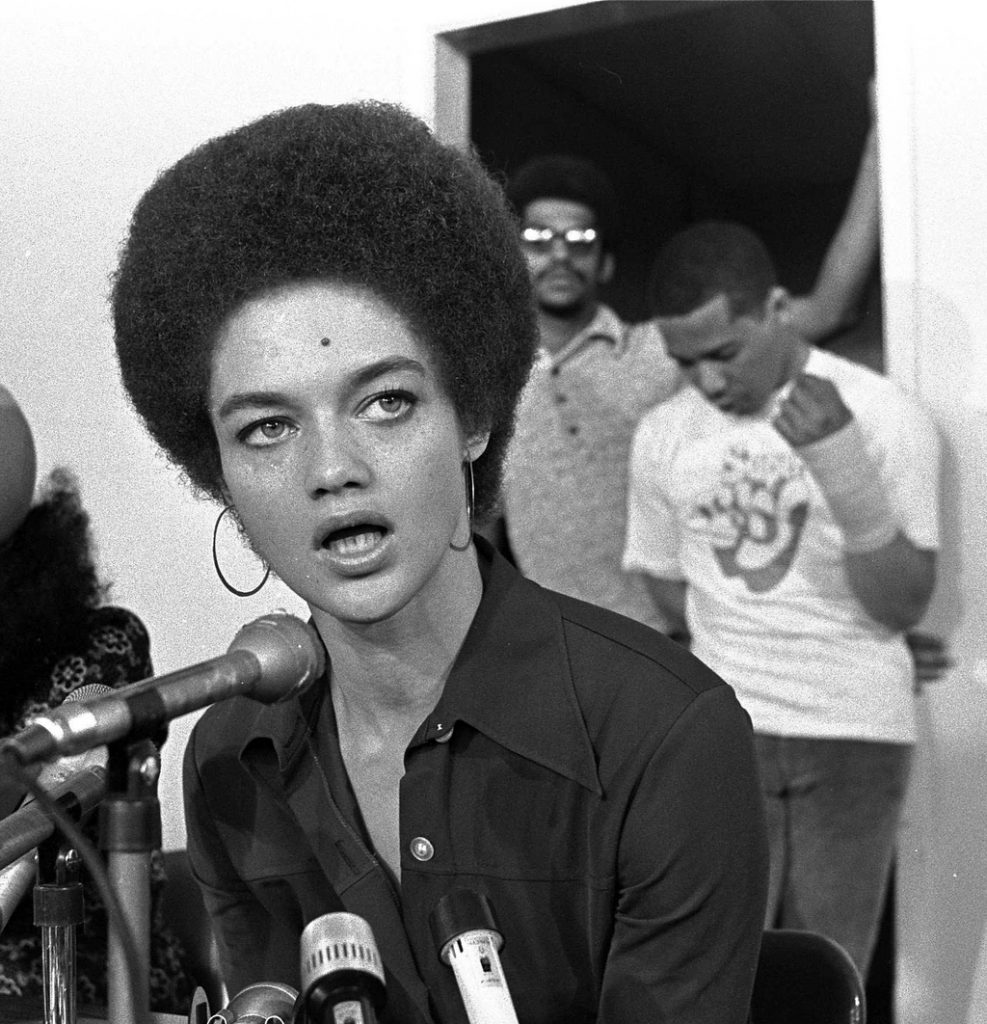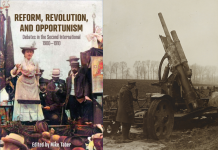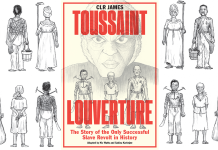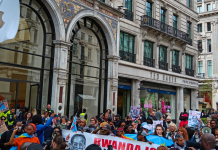We need to remember the contributions of black women to past struggles if we’re to take forward the fight for justice today, writes Shanice McBean.

Black women are at the forefront of the struggle that has emerged following the murders of Michael Brown and Eric Garner. The political rage and spirit of resistance felt from protests around the world seem much more like the stuff of a movement, as opposed to a mere moment. While the protests have been a response to the negation of human life, they also aim to affirm it. ‘Hands up, don’t shoot’, ostensibly a response to murderous police brutality, rings in harmony with ‘Black lives matter’, an affirmation of dignity and humanity. The protests are visionary in as many parts as they are reactive.
That black women are visible leaders in such a struggle is therefore significant. The names of the visionaries of our past anti-racist struggles take the form of Martin, Malcolm, Huey, Bobby, Stokely, Fred, George and Bayard. Some of us know about Ella, Fannie, Rosa, Elaine, Angela, Erika, Assata and Kathleen. Few of us pay much attention to the content of these women’s politics, their contributions in shaping Civil Rights and Black Power organizations or the lessons they offer us today.
While we fight for a vision of society where it is illegal for police terrorists to murder ‘thugs’ and ‘criminals’ (supposed euphemisms racists use as synonyms for ‘blacks’) on the streets, it’s worth reminding ourselves of the lessons of our past in order to strengthen the struggles of the future.
‘Pussy Power’
The Black Panther Party (BPP) was founded in 1966 Oakland, California. Originally called the Black Panther Party for Self-Defense, central to the party’s politics was affirming black power, dignity and rights through armed confrontation. Confrontation in this context is not meant as insurrection or even provocation but, rather, as self-defense; as not capitulating when met with the sharp end of oppressive social forces. It is confrontation understood in this way that led to the initial and rapid success of the BPP. Confrontation with local Oakland police which ended with a crowd of local black people cheering as the police withdrew from armed Panthers, confrontation with police and the media whilst providing armed security for Betty Shabazz at San Francisco airport and confrontation while storming the state capitol with guns solidified the BPP reputation as not just fighting against police brutality but also for black power.

The politics of confrontation, however, provided fertile ground for the seeds of black male chauvinism to ferment, sprout and eventually blossom within the party. While women who joined the BPP from the beginning were armed and taught to shoot, in the early years of the party it was always under the proviso that they were subordinate to the men. Many of the men coming into the organization (men who almost always had no previous exposure to organized politics), saw armed self-defense more as affirmation of black masculinity in the face of the dehumanizing structures of The White Man rather than affirmation of a universal black dignity.
It would be a mistake to view this as a problem of ‘ignorant’ rank and file members. Eldridge Cleaver, a convicted rapist who sat on the BPP central committee, was known for his extreme disregard for women in the party. He was violent towards his partner Kathleen Cleaver, threatened to murder leading party member Elaine Brown and regularly referred to female cadre as having ‘pussy power’. In her auto-biography A Taste of Power, Elaine Brown claims that Bobby Seale, co-founder and the initial chairman of the BPP, was involved in advocating the idea that women should ‘give it up’ to revolutionary men in struggle and learn to ‘shoot as well as cook’. When Elaine was beaten up by underground BPP leader Steve (who replaced Bunchy Carter after his murder) most members, including leading members like Raymond Hewitt and Huey Newton, argued that it wasn’t the party’s business and was a ‘personal’ matter. Some even argued that because of Elaine’s assertive womanhood she ‘had it coming’.
The black power movement as a whole and its leaders often had dismal attitudes towards women. At meetings organized by Ron Karenga’s US Organization, men were referred to as ‘our warriors’ by women who were tasked with cooking for and serving them. Women who defected from these gross patterns of socialization were seen as abandoning their true role within the struggle for liberation.

Challenges from Within
What is important in recalling the often intense sexism within the BPP is their difficult but gradual move away from it. As more women joined the party and the politics of the organization developed a battle eventually emerged between those who fought for a revolutionary vision of women as equals with men and those who unquestioningly latched on to the reactionary ideas of male chauvinism and supremacy.
As women Panthers found themselves locked up as political prisoners facing the oppressive and repressive fist of a panicked America, it became more difficult for Panther men to deny the equal strength, rage and revolutionary fervour of Panther women. In other words, the experience of struggle, confronting the state and fighting for a revolutionised society provided the conditions whereby anti-sexist Panthers could confront reactionary views about women.
But it wasn’t just the experience of struggle alone that gave ballast to a process of change. It is not automatic that chanting ‘Free Huey’ with a woman chanting as loud as you, or, being arrested with a Panther woman, changes your sexist ideas. The process was one of active change.
Women part of the Los Angeles chapter of the BPP such as Elaine Brown and Erika Huggins – pejoratively known as the ‘clique’ – asserted themselves and acted as leaders both within the organization and in broader struggle. In 1969 Illinois chairman Fred Hampton held a meeting condemning sexism; introducing Panther’s in his chapter to a revolutionary politics that moved beyond liberation being a simple equation of confrontation between black men and the system. When party founder, leader and Minister of Defense Huey Newton was released from prison following false charges of manslaughter of a police officer, he led a polemic in the party against understanding sexual and romantic relationships as ownership of ‘my man’ or ‘my woman’. Arguing that understanding human relations in this way reflected the pervasive infiltration of capitalist property relations within the social sphere, he pushed for equal partnership between men and women in the party. Men and women were to be comrades, not sexual property. This process of gradual political evolution within the BPP is well reflected in the general acceptance of Elaine Brown’s leadership of the organization when exiled Huey Newton appointed her as absolute leader in 1974.
Crucial to this process was defiance in the face of sexism but not seeing chauvinistic black men as a lost cause. Simultaneously, the unifying power of struggle was utilised by actively fighting for a better political position on women.
Women in the struggle today
It is natural that black women would assume leadership in a struggle against the denial that black lives matter. Our bodies are regularly subject to state violence in the form of sterilization, sexual violence and, increasingly, as pawns of the prison industrial complex. Our bodies are used as the loci for justifying the ideology of race and as super-exploitable cogs in globalized capitalism. As the BPP position on women changed more women were able to flourish as leaders and more women joined the party as fighters; this only strengthened the organization. The leadership of women in the struggles that have emerged in reaction to police brutality and in affirmation of black lives today is, therefore, a sign of the strength of these struggles. Still, the struggle against sexism is a continual and active struggle, or, it is a dead one. This is why it’s so important that organizations like Millennial Activists United are actively building black women’s leadership and challenging sexism as it crops up in the movement. It’s why it’s important that young, black UK based organizations like London Black Revolutionaries use their influence and platform to discuss issues like rape.

Unity in a society built on oppression has to navigate thorny, dirty and difficult terrain. The history of the BPP is instructive here. Unity certainly cannot come about by ignoring the oppressive social relations that divide us; they have to be righteously confronted. But we cannot expect our movements to be sanitized. The BPP women were instrumental to building the organization and developing the basis for an anti-sexist BPP; something they achieved by challenging the sexism of their brothers while standing shoulder to shoulder with them against the police.
The reality is the same police who execute black men and women on the streets are the same ones who beat and battered the miners and murdered the 96 of Hillsborough. They’re the same ones capitalists use to gentrify areas like Soho in London by forcibly removing sex workers from safe working spaces. They’re the same ones who not only kill, but rape with impunity. They’re the same ones who mock and abuse trans* women; who arrested CeCe McDonald yet sympathized with her attackers. They’re the same ones who receive training from the Israeli army renowned for murdering Palestinians in the name of colonial rule. This shared experience is a real basis for solidarity.
Capitalism, the ultimate arbiter of all oppression, is a system not compartmentalized into single units of oppression: it exists as a totality. Class exploitation and all forms of oppression are, as a result, constituted in such a way as to connect the dismantling of the Master’s front yard to the dismantling of his entire house. The histories of working class exploitation, sexism, racism, homophobia, transphobia, colonialism, imperialism and all forms of institutionalized oppression are integrated, not separate, histories. Our struggles are therefore integrated. It is with this understanding and in this spirit the slogan Black Lives Matter should be sung with the voices of those who yearn to live in a system free from the rot of capitalistic exploitation, those who assert that trans* women/men are women/men and those who want to see a Free Palestine. We should sing with a clarity that means each note can be heard in its own right, but together they harmonise the chords of liberation.
This piece was originally published on the sheisrevolutionarilysuicidal blog.


















[…] is extremely male, a creative decision that doesn’t reflect Hampton’s own commitment to gender solitary within revolutionary politics. That said, any soundtrack that includes such highs as the brand new Nas cut ‘EPMD’ […]
[…] McBean ‘“Shoot As Well As Cook”: the Black Panther Party, sexism and the struggle today’ RS21 December […]